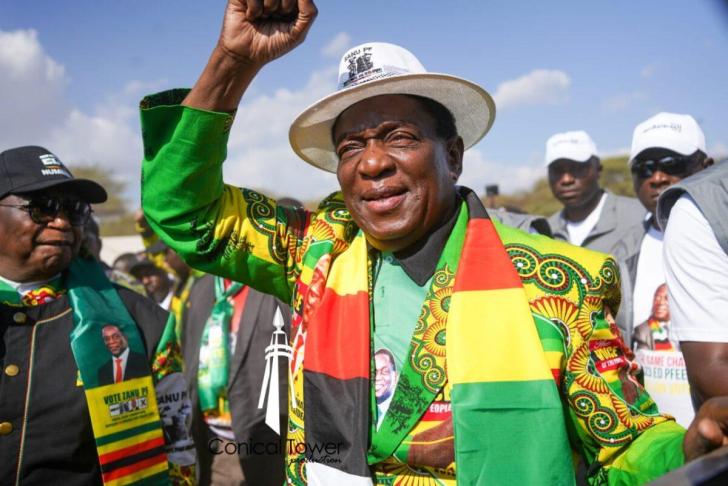News / Local
Zimbabwe presidential hopefuls use music, stars to woo crucial youth vote
11 Aug 2023 at 17:53hrs |
1 Views

The local version of Jamaican dancehall has become the unofficial soundtrack of Zimbabwe's presidential election as candidates go all out to woo a key generation of voters who were children when long-time ruler Robert Mugabe was ousted six years ago.
But while many young voters have been energised by a high-tempo campaign featuring pop stars and sporting heroes, a generation that has only known economic chaos and rocketing prices is taking some convincing that real change is possible.
The leading candidates on the Aug. 23 ballot are incumbent Emmerson Mnangagwa of the long time ruling Zanu-PF party and Nelson Chamisa of the new Citizens Coalition for Change.
Mnangagwa, who became leader in 2017 after the army kicked out Mugabe, beat Chamisa in 2018 by 6%, just over 300,000 votes.
Any path to victory has to lie through the three-quarters of Zimbabwe's population that is under 34. The one-sixth of the registered electorate who are first-time voters will be crucial.
"There is a high probability that this election will be decided by the first-time voters," said Brighton Tamberekera, a projects officer at vote watchdog Zimbabwe Election Support Network.
"We hope that the youths who are registered do turn up to vote."
Political parties are doing everything they can to win them over, posting social media videos featuring pop stars and fielding younger candidates in parliamentary and council contests.
Most campaign rallies blare out the local version of Jamaican dancehall music, hugely popular among the youth. Former world boxing champion Floyd Mayweather attended a Zanu-PF political campaign event last month.
While the election is competitive, few believe it will be free and fair, as so many past votes were marred by systematic violence and voter intimidation.
"I am not voting because our votes never count anyway," said Chipo Kanengoni, a 26-year-old intern at a Harare accounting firm. "They always rig, so there is no point".
Others will need to be convinced that entrenched economic problems can be fixed.
Mugabe's decades-long rule was marked by disastrous economic policies such as printing money to pay the government's bills, leading to a billion percent inflation at one point.
Land seized from white commercial farmers was often handed to party loyalists unequipped to farm it, and who often left it fallow.
While Mnangagwa has promised to extend economic opportunities to the youth in sectors such as agriculture and mining, he is widely seen as having far failed to turn the economy around during his first term.
Chamisa has promised to create youth jobs youth by boosting the informal sector.
Tinotenda Mandizha, 25, said he was excited to be voting for the first time but had yet to be convinced any of the dozen candidates could truly transform the prospects of his generation.
"We live from hand to mouth, others will end up stealing or getting into drugs," said Mandizha, who ekes out a living selling his mother's homemade kitchenware.
"Our cries are not being heard as young people."
But while many young voters have been energised by a high-tempo campaign featuring pop stars and sporting heroes, a generation that has only known economic chaos and rocketing prices is taking some convincing that real change is possible.
The leading candidates on the Aug. 23 ballot are incumbent Emmerson Mnangagwa of the long time ruling Zanu-PF party and Nelson Chamisa of the new Citizens Coalition for Change.
Mnangagwa, who became leader in 2017 after the army kicked out Mugabe, beat Chamisa in 2018 by 6%, just over 300,000 votes.
Any path to victory has to lie through the three-quarters of Zimbabwe's population that is under 34. The one-sixth of the registered electorate who are first-time voters will be crucial.
"There is a high probability that this election will be decided by the first-time voters," said Brighton Tamberekera, a projects officer at vote watchdog Zimbabwe Election Support Network.
"We hope that the youths who are registered do turn up to vote."
Political parties are doing everything they can to win them over, posting social media videos featuring pop stars and fielding younger candidates in parliamentary and council contests.
Most campaign rallies blare out the local version of Jamaican dancehall music, hugely popular among the youth. Former world boxing champion Floyd Mayweather attended a Zanu-PF political campaign event last month.
"I am not voting because our votes never count anyway," said Chipo Kanengoni, a 26-year-old intern at a Harare accounting firm. "They always rig, so there is no point".
Others will need to be convinced that entrenched economic problems can be fixed.
Mugabe's decades-long rule was marked by disastrous economic policies such as printing money to pay the government's bills, leading to a billion percent inflation at one point.
Land seized from white commercial farmers was often handed to party loyalists unequipped to farm it, and who often left it fallow.
While Mnangagwa has promised to extend economic opportunities to the youth in sectors such as agriculture and mining, he is widely seen as having far failed to turn the economy around during his first term.
Chamisa has promised to create youth jobs youth by boosting the informal sector.
Tinotenda Mandizha, 25, said he was excited to be voting for the first time but had yet to be convinced any of the dozen candidates could truly transform the prospects of his generation.
"We live from hand to mouth, others will end up stealing or getting into drugs," said Mandizha, who ekes out a living selling his mother's homemade kitchenware.
"Our cries are not being heard as young people."
Source - Reuters
Join the discussion
Loading comments…



































